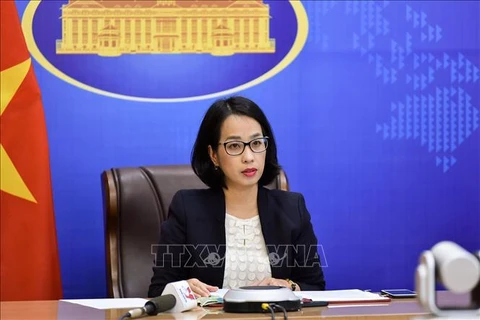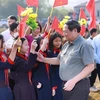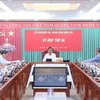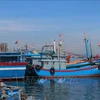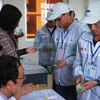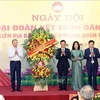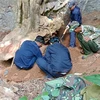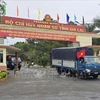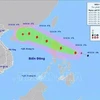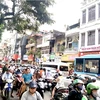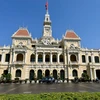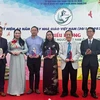Hanoi (VNA) - Over the past two years, despite focusing resources on combating the COVID-19 pandemic, the Party, Government, ministries, sectors and localities have prioritised preventing and combating human trafficking as a key task.
80% of victims taken to bordering countries
Deputy Minister of Public Security, Senior Lieutenant General Tran Quoc To said that human trafficking crime occurs in most areas, from urban to rural or remote ones, with increasingly sophisticated tricks, especially through cyberspace. Traffickers have colluded closely to form inter-provincial, transnational and international rings.
Human trafficking now commonly takes the forms of child adoption, surrogacy, marrying a foreigner, labour export, illegal migration, illegal border crossings, and going abroad to visit relatives and travel.
An example is a recent case of illegally sending labourers to work in Cambodia.
According to To, 80% of the human trafficking victims have landed in countries with a land border with Vietnam. The rest are trafficked to some other countries by land, air and sea. Therefore, competent forces have faced numerous obstacles in preventing, detecting, investigating, and handling human trafficking cases.
Minister of Labour, Invalids and Social Affairs Dao Ngoc Dung said that there are many reasons for the increase in human trafficking in the world, such as migration, the rich - poor gap, economic and political instabilities, natural disasters, climate change, and epidemics. The development of cyberspace and digital platforms has facilitated human trafficking crime. An open-door policy and global integration have created opportunities for traffickers to move and bring victims across borders easily and safely in the guise of doing business, visiting relatives and travelling.
"Recently, due to the complicated situation of the COVID-19 pandemic, many people have encountered difficulties in finding a stable job, offering a favourable condition for criminals to seduce victims to go abroad," warned Minister Dung.
Strengthening inter-sectoral cooperation
Human trafficking causes particularly serious consequences on human rights and negatively impacts the political security of each country. It also leads to other violations such as illegal immigration, falsifying documents, prostitution and drug smuggling. Amid the complicated development in crime, the Party, National Assembly, Government, ministries, sectors and localities have always taken a wide range of measures against human trafficking.
In addition to the implementation of the law on human trafficking prevention and combat, the Prime Minister issued programmes, schemes and plans to better implement these laws, including a decision on establishing and consolidating the Government's Steering Committee for Crime Prevention and Control (Steering Committee 138/CP); Decision No. 193/QD-TTg approving the Programme on prevention and combat of human trafficking in the 2021-2025 period and orientation to 2030; and Decision No. 1957/QD-TTg approving the Plan on implementation of the ASEAN Convention Against Trafficking in Persons, especially Women and Children.
In addition, Vietnam has always been an active and responsible member of the United Nations Convention, the ASEAN Convention, the Protocol and the bilateral cooperation agreements between Vietnam and relevant countries on human trafficking prevention and combat.
The Ministry of Labour, War Invalids and Social Affairs, the Ministry of Public Security, the Ministry of National Defence, and the Ministry of Foreign Affairs have signed regulations on coordination in the reception, protection and support of human trafficking victims. The coordination regulations focus on clarifying and accelerating the implementation of several basic tasks, such as strengthening information work and improving the quality of reception, verification, protection and support of victims.
Minister of Foreign Affairs Bui Thanh Son emphasised that human trafficking causes heavy and lingery consequences for victims, their families and the whole society, requiring the work of receiving, supporting, protecting, and supporting the victims in reintegrating into the community.
The timely, close and concerted coordination between ministries through the coordination regulations is a key factor in improving the efficiency of the work, he noted./.
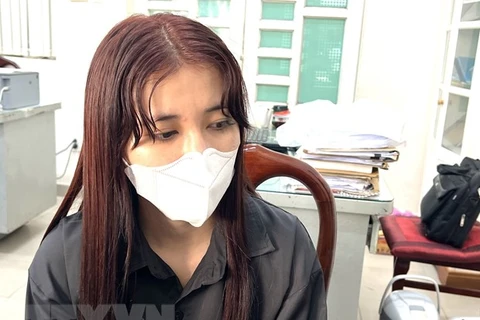
Dong Nai police arrest human traffickers for prostitution in Cambodia
Police in the southern province of Dong Nai on December 28 arrested three men and a woman for their involvement in trafficking in persons, organising illegal migration and bringing persons abroad for prostitution.

